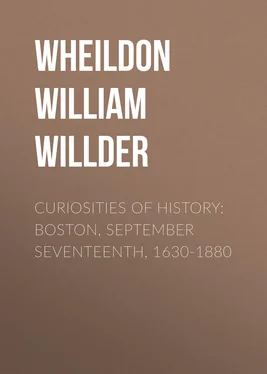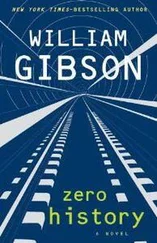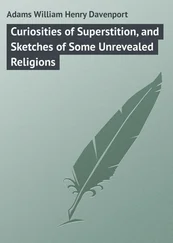William Wheildon - Curiosities of History - Boston, September Seventeenth, 1630-1880
Здесь есть возможность читать онлайн «William Wheildon - Curiosities of History - Boston, September Seventeenth, 1630-1880» — ознакомительный отрывок электронной книги совершенно бесплатно, а после прочтения отрывка купить полную версию. В некоторых случаях можно слушать аудио, скачать через торрент в формате fb2 и присутствует краткое содержание. Жанр: Путешествия и география, История, foreign_edu, foreign_antique, foreign_prose, на английском языке. Описание произведения, (предисловие) а так же отзывы посетителей доступны на портале библиотеки ЛибКат.
- Название:Curiosities of History: Boston, September Seventeenth, 1630-1880
- Автор:
- Жанр:
- Год:неизвестен
- ISBN:нет данных
- Рейтинг книги:4 / 5. Голосов: 1
-
Избранное:Добавить в избранное
- Отзывы:
-
Ваша оценка:
- 80
- 1
- 2
- 3
- 4
- 5
Curiosities of History: Boston, September Seventeenth, 1630-1880: краткое содержание, описание и аннотация
Предлагаем к чтению аннотацию, описание, краткое содержание или предисловие (зависит от того, что написал сам автор книги «Curiosities of History: Boston, September Seventeenth, 1630-1880»). Если вы не нашли необходимую информацию о книге — напишите в комментариях, мы постараемся отыскать её.
Curiosities of History: Boston, September Seventeenth, 1630-1880 — читать онлайн ознакомительный отрывок
Ниже представлен текст книги, разбитый по страницам. Система сохранения места последней прочитанной страницы, позволяет с удобством читать онлайн бесплатно книгу «Curiosities of History: Boston, September Seventeenth, 1630-1880», без необходимости каждый раз заново искать на чём Вы остановились. Поставьте закладку, и сможете в любой момент перейти на страницу, на которой закончили чтение.
Интервал:
Закладка:
William W. Wheildon
Curiosities of History: Boston, September Seventeenth, 1630-1880
INTRODUCTION
It seems proper to say in offering this little volume to the public, that no attempt has been made to exhaust the subjects of which the papers respectively treat; but rather to enlarge upon matters of historical interest to Boston, which have been referred to only in a general way by historians and previous writers.—This idea rather than any determination to select merely curious topics, has in a large measure influenced the writer; and the endeavor has been to treat them freely and fairly, and present what may be new, or comparatively new, concerning them, from such sources as are now accessible and have been open to the writer. It is not, however, intended to say that an impulse towards some curious matters of history has not been indulged, and, indeed, considering the subjects and materials which presented themselves, could scarcely have been avoided, which was by no means desirable. Although it has been impertinently said, that “the most curious thing to be found is a woman not curious,” we submit that curiosity is a quality not to be disparaged by wit or sarcasm, but is rather the germ and quality of progress in art and science and history.
It has been impossible to correct or qualify, or perhaps we might say avoid, all the errors, mistakes, or contradictions, which have been encountered in preparing these pages; and very possibly we may have inadvertently added to the number. At all events, with our best endeavors against being drawn into or multiplying errors, we lay no claim to invulnerability in the matter of accuracy, or immaculacy in the way of opinions; and we very sincerely add, if errors or mistakes have been made and are found, we shall be glad to be apprised of them. There are errors in our history which it is scarcely worth the while to attempt to correct, although they are not to be countenanced and should not be repeated.
A period of two hundred and fifty years since the settlement of the town includes and covers a history of no ordinary character, involving progress and development, not merely of customs, manners and opinions, but of principles, passions and government. The city is a creation, as it were, by the art and industry of man; and, with the reverence of Cotton Mather himself, we add, “With the help of God!” and we venture the comparison that no change or growth, improvement or embellishment, is to be found in the settlement or the city, that may not be paralleled in the growth, advancement and elevation of its people: indeed, we go even farther than this, the material progress to be seen around us, in all its multifarious forms and combinations, item by item, small or great, is indicative only of the advancement of the people, and marks the progress of moral, mental and intellectual power—of art, science and knowledge.
We take this opportunity to acknowledge our indebtedness to several friends for the loan and use of many rare and valuable works in the preparation of this history, and in particular to Messrs. John A. Lewis and John L. DeWolf, of Boston, and Mr. J. Ward Dean, of the N. E. His. Gen. Society.
I.
TOPOGRAPHY OF BOSTON
There is a line of Cowper to the effect that “God made the country, and man made the town;” and there is probably no more striking evidence of the truthfulness of the axiom than is to be found in the history and growth of Boston, between the years 1630 and 1880, confirming in a remarkable manner Capt. Wood’s prophecy concerning the town, in 1650: viz., “whose continuall inlargement presages some sumptuous city.” The original territory which has formed the basis, so to speak, of Boston proper, was a peninsula, and appeared like two islands, or, by the continued operation of the sea, was likely to become so. Its distinguishing feature was to be found in its three prominent hills, or, perhaps, its two hills and its three-peaked mountain. These were her jewels: they have since represented her fame, her history, her sentiments; for these were all wrapped around them. The peninsula was a point of land projected into the harbor, with a narrow neck connecting it with the mainland, and another narrow place in the vicinity of what is now Dock Square, which was once quite open to the harbor. In length from the south line at Roxbury, it was something less than three miles (two and three-fourths and two hundred and thirty-eight yards). Its width at the widest point, between Wheelwright’s wharf (afterwards Rowe’s, and now Foster’s) to Barton’s Point, Leverett Street, was something over one mile, and its circumference about four miles.
The first impression of the “island” which has been recorded is that of Anne Pollard, who died in Boston, Dec. 6, 1725, at the age of 105 years, and left over one hundred descendants. She always said that she came over from Charlestown, in 1630, in the first boat that crossed with Gov. Winthrop’s party, and, being what might now be called a romping girl for those times, ten years of age, was “the first to jump ashore;” and she afterwards described the place “as being at that time very uneven, abounding in small hollows and swamp, and covered with blueberry and other bushes.” We do not think there is any one inclined to dispute this statement, or question its truthfulness.
There are several descriptions of early Boston, topographical and otherwise, which have been quoted by subsequent writers upon the subject, rather as curious and original than as having any particular merit in themselves. First among these is that of Capt. Edward Johnson, in his “Wonder-Working Providence of Sion’s Saviour in New England,” written about 1640. He describes it as surrounded by the brinish flood, “saving one small Istmos which gives free access to the neighbor townes,” and says, “At their first landing the hideous thickets in this place were such that wolfes and beares nurst up their young from the eyes of all beholders.... The forme of this Towne is like a hearte, naturally situated for fortifications, having two hills on the frontice part thereof next the sea.” These were Fort and Mill (Copps’) Hills. “Betwixt these two strong armes lies a large cove or bay, on which the chiefest part of the town is built, overtopped with a third hill” (Sentry or Beacon Hill). There were two smaller hills on the Common, on one of which Gen. Gage afterwards built a battery, when the town was in his military possession, and on the other a powder-house.
Another curious description of Boston is given in Wood’s “New England’s Prospect:”—
“Boston is two miles North-east from Roxberry. His situation is very pleasant, being a Peninsula hemm’d in on the south side with the Bay of Roxberry, and on the north side with Charles River, the marshes on the back side being not half a quarter of a mile over; so that a little fencing will secure their cattle from the woolves. It being a Necke and bare of wood, they are not troubled with those great annoyances, wolves, rattlesnakes and musquetoes.... This Necke of Land is not above four miles in compasse, in forme almost square, having on the south side at one corner a great broad hill, whereon is planted a Fort, which can command any ship as shee sayles into any Harbour within the still Bay. On the north side is another Hill equall in bignesse, whereon stands a winde mill. To the north-west is a high Mountaine, with three little rising Hills on the top of it, wherfore it is called Tramount.... This town although it be neither the greatest, nor the richest, yet is the most noted and frequented, being the Center of the Plantations, where the monthly Courts are kept. Here likewise dwells the Governor. This place hath very good land, affording rich Corne-fields, and fruitful gardens, having likewise sweete and pleasant springs.”
Читать дальшеИнтервал:
Закладка:
Похожие книги на «Curiosities of History: Boston, September Seventeenth, 1630-1880»
Представляем Вашему вниманию похожие книги на «Curiosities of History: Boston, September Seventeenth, 1630-1880» списком для выбора. Мы отобрали схожую по названию и смыслу литературу в надежде предоставить читателям больше вариантов отыскать новые, интересные, ещё непрочитанные произведения.
Обсуждение, отзывы о книге «Curiosities of History: Boston, September Seventeenth, 1630-1880» и просто собственные мнения читателей. Оставьте ваши комментарии, напишите, что Вы думаете о произведении, его смысле или главных героях. Укажите что конкретно понравилось, а что нет, и почему Вы так считаете.












